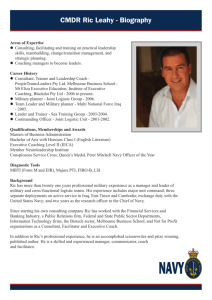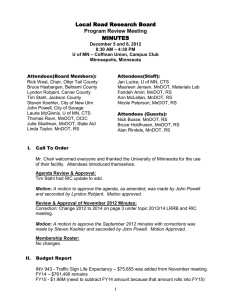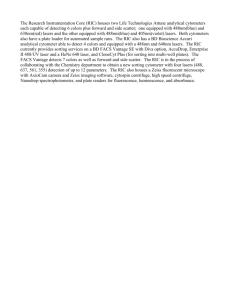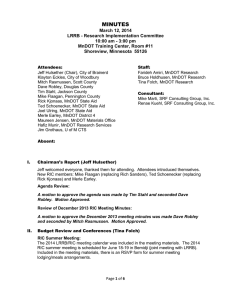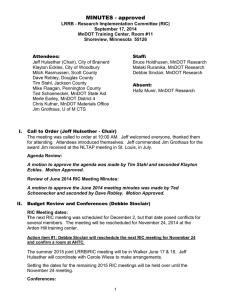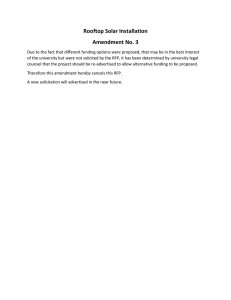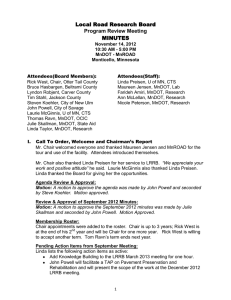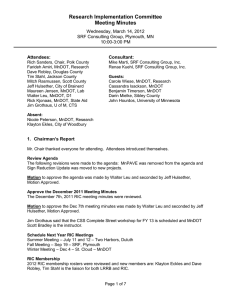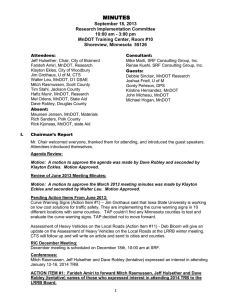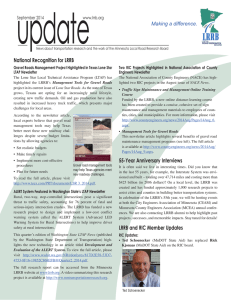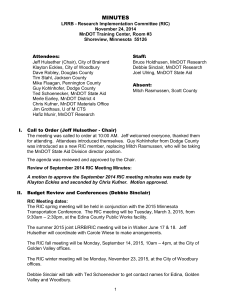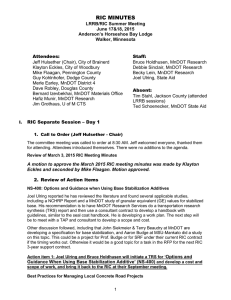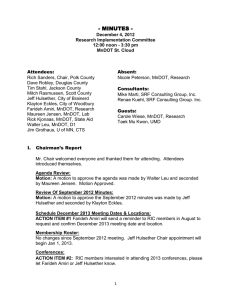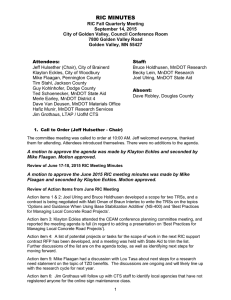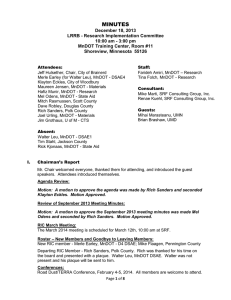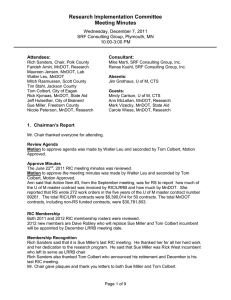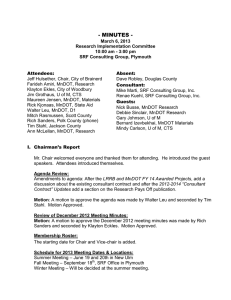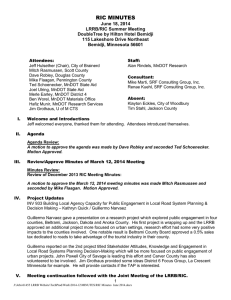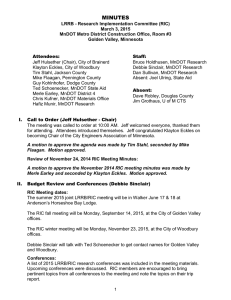RIC MINUTES
advertisement
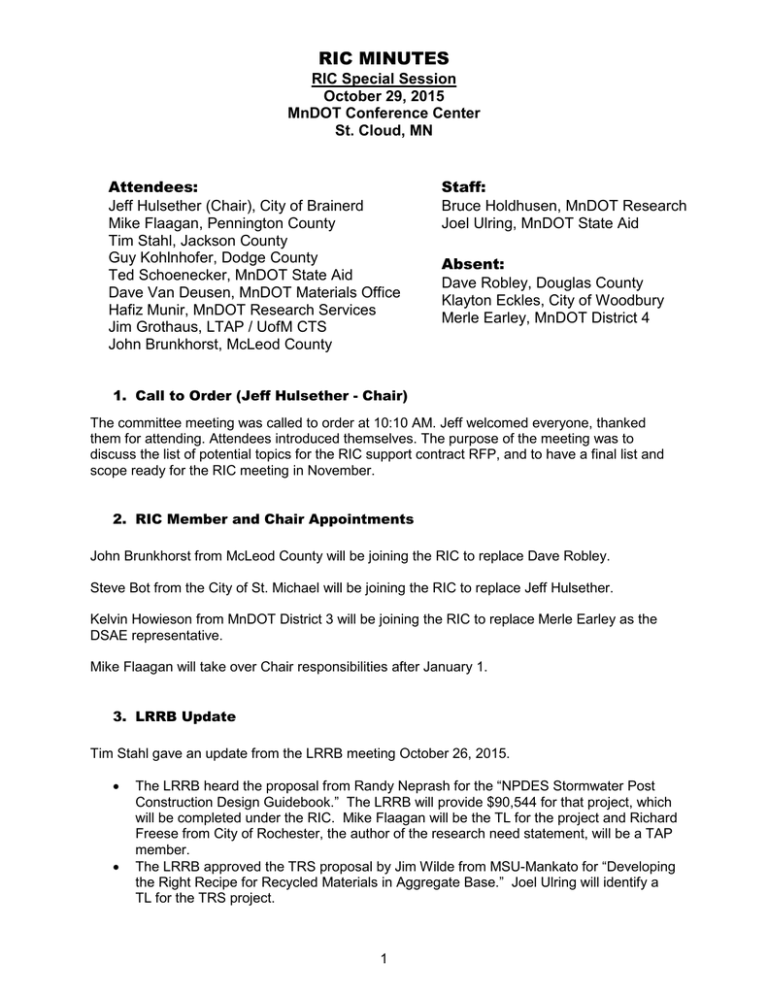
RIC MINUTES RIC Special Session October 29, 2015 MnDOT Conference Center St. Cloud, MN Attendees: Jeff Hulsether (Chair), City of Brainerd Mike Flaagan, Pennington County Tim Stahl, Jackson County Guy Kohlnhofer, Dodge County Ted Schoenecker, MnDOT State Aid Dave Van Deusen, MnDOT Materials Office Hafiz Munir, MnDOT Research Services Jim Grothaus, LTAP / UofM CTS John Brunkhorst, McLeod County Staff: Bruce Holdhusen, MnDOT Research Joel Ulring, MnDOT State Aid Absent: Dave Robley, Douglas County Klayton Eckles, City of Woodbury Merle Earley, MnDOT District 4 1. Call to Order (Jeff Hulsether - Chair) The committee meeting was called to order at 10:10 AM. Jeff welcomed everyone, thanked them for attending. Attendees introduced themselves. The purpose of the meeting was to discuss the list of potential topics for the RIC support contract RFP, and to have a final list and scope ready for the RIC meeting in November. 2. RIC Member and Chair Appointments John Brunkhorst from McLeod County will be joining the RIC to replace Dave Robley. Steve Bot from the City of St. Michael will be joining the RIC to replace Jeff Hulsether. Kelvin Howieson from MnDOT District 3 will be joining the RIC to replace Merle Earley as the DSAE representative. Mike Flaagan will take over Chair responsibilities after January 1. 3. LRRB Update Tim Stahl gave an update from the LRRB meeting October 26, 2015. • • The LRRB heard the proposal from Randy Neprash for the “NPDES Stormwater Post Construction Design Guidebook.” The LRRB will provide $90,544 for that project, which will be completed under the RIC. Mike Flaagan will be the TL for the project and Richard Freese from City of Rochester, the author of the research need statement, will be a TAP member. The LRRB approved the TRS proposal by Jim Wilde from MSU-Mankato for “Developing the Right Recipe for Recycled Materials in Aggregate Base.” Joel Ulring will identify a TL for the TRS project. 1 • • • The LRRB approved funding for a TRS by CTC & Assoc. on the topic of “Consolidated Asset Management Systems for Local Agencies.” Lyndon Robjent will be the TL for the TRS project. The LRRB did not approve funding for the TRS on “Managing Concrete Road Projects for Local Agencies” nor the TRS on “Best Practices for Base Stabilization.” Following a presentation to the LRRB by Doug Gransberg of Iowa State on “Major Equipment Life Cycle Cost Analysis (INV 950)”, they are looking for counties to test the cost spreadsheet developed from that project. o Guy Kohlnhofer volunteered to test it in Dodge County. o John Brunkhorst volunteered to test it in McLeod County. 4. Future RIC Project Ideas and RIC Support Contract RFP A spreadsheet was provided with the votes of most of the RIC members on priorities for the topics for the RIC support contract RFP. The committee discussed the high priority topics: • Pilot Project for One Stop Shop Transportation Permitting – This will not be part of the RFP but is a high priority and should be a separate contract. Ted Schoenecker said State Aid admin account could match the RIC at about $40,000 from each source for that contract. • Waste Shingles for Stabilization or Dust Control on Gravel Roads or Shoulders – Tom Wood and Ed Johnson at the MnDOT Office of Materials will finish this work, and it does not go on the RFP. A product could be a cost analysis of the benefits vs. the cost of collecting and blending shingle materials. • Lightly Surfaced Roads / Stabilized Aggregate Applications – This should go on the RFP. Include double chip seals and Otta seal on gravel roads, use of Otta seal with stabilized base, decision tree and guideline with economics worked into it on whether to keep as gravel or whether to consider a LSR treatment. Include use of LSR for dust control vs. calcium chloride. Develop a ½-day training class including where does it apply, how to prep for it, how to do it. Include cost comparison of repeated blading maintenance vs. cost of LSR. Maybe it could be combined with the topic on Gravel Road Management Tools. Jim Grothaus will write up a draft scope, and a TL will be identified at a later time. • Base Stabilization Additives – Put this on the RFP. A good approach would be a design selection guideline for county engineers to make a decision, then they would hire a consultant to do a mix design. Also develop a generic specification. For example, Base One is a silica-based material used for gravel roads or under paving. Joel Ulring will write a draft scope based on the TRS. • Major Equipment Life Cycle Cost Analysis – A pilot or beta-test by a few counties for fleet management. The RIC product would be oriented to provide step-by-step procedures for those that do not have anything in place yet. The Iowa State project would be only one component, and other existing software systems would be compared. When does it cost more to keep a piece of equipment than to replace it? Exclude routine maintenance and wear and tear from the cost evaluation. A good outcome would fit with the planning cycle for decision makers such as county board, to explain why a stable funding plan is needed although the expenditures will vary from year to year. Include things for small, non-MSAS cities. Tim Stahl will be the TL and will write up the draft scope. 2 • Optimal Timing of Preventive Maintenance for HMA Pavement – Put this on the RFP. Look at what is currently known by combining observed pavement condition ratings with what is known about county chip seal programs. State Aid has a new research project started but it will take 10 years for the results to be known. The RIC project would take what is currently known and provide interim recommendations, not limited to seal coats but possibly including rejuvenation treatments, as some jurisdictions do not use chip seals at all. The RIC task should not focus on the environmental aging aspect, just what seems to work overall. Joel Ulring will write up a draft scope. • Pavement Management Tools – Looking for a common and consistent method of rating pavement condition. MCEA is starting a pavement management committee and we should wait for recommendations. This one will not be on the RFP. • Gravel Road Management Tools – This should go on the RFP based on the results of TRS 1407. There are already videos on gravel road maintenance, and a South Dakota manual on gravel road maintenance. The focus would be on roads with traffic volumes too high for gravel but not high enough to justify paving. • Jim Grothaus referred to the poster session from the NLTAP meeting, and suggested there is a lot of opportunity to take an existing manual or guide and put it online or in a smartphone app. Examples include a pavement evaluation guide, noxious weeds identifier, native grasses identifier, etc. This could be a future task in the RFP – the consultant can search, evaluate and propose which ones would be the best fit. • Consolidated Asset Management for Local Agencies – This should be on the RFP and can be based on the outcome of the TRS. Step-by-step guide for developing an asset management plan for the 80 non-Metro counties and smaller cities. Bruce Holdhusen will write a draft scope. • Jeff Hulsether asked that each person tasked with writing a scope please send to Bruce Holdhusen to consolidate into one document and send back to the group. The Committee was adjourned by Chair Jeff Hulsether at 1:35 PM. Next RIC Quarterly Meeting: 10AM November 23 at the City of Woodbury. 3
